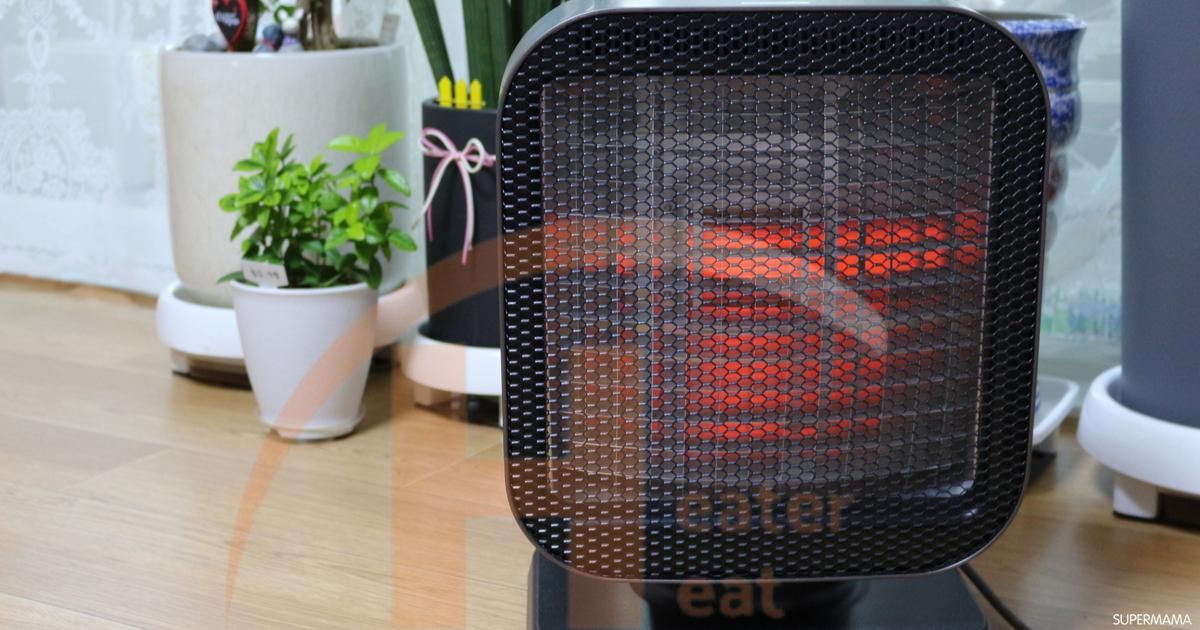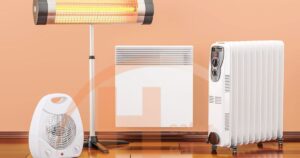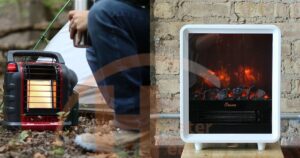The amount of electricity an electric heater uses depends on its wattage. Higher-wattage heaters consume more energy, so check the wattage of your device to estimate its impact on your electricity bill.
Envision a snug room, the warmth wrapping around. However, amid the coziness, have you pondered the financial toll it takes? Dive into the intricate details, unravel the mystery, and grasp how your heater’s energy consumption might influence your monthly bills.
Electric heaters typically range from 500 to 1500 watts, giving you an idea of their power. Electric heaters vary in wattage, affecting their electricity consumption. Understanding the wattage can help you estimate the cost and make informed decisions for efficient heating in your home.
| Space Heater Wattage | Length Of Time Powered | K Wh Of Electricity Used |
| 1,500 W | 1 hour | 1.5 kWh |
| 1,500 W | 1 day | 12 kWh |
| 1,500 W | 1 week | 84 kWh |
| 1,500 W | 1 month | 364 kWh |
| 1,500 W | 1 year | 1,820 kWh |
What is an Electric Heater?
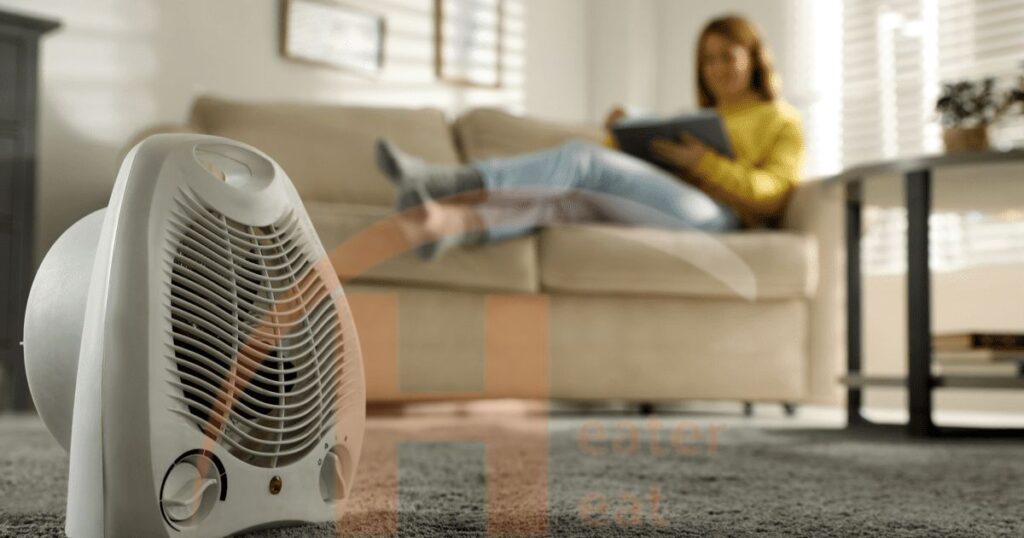
An electric heater is designed to generate heat using electricity as its power source. It typically consists of a heating element, which converts electrical energy into heat, and a fan or other mechanism to distribute the warmth. Electric heaters come in various forms, including space heaters for personal use, baseboard heaters for room heating, and radiant heaters that emit heat directly.
The working principle of an electric heater involves the passage of electric current through a resistive element, such as a coil or wire. As the current flows, the resistance in the element causes it to heat up, producing warmth in the surrounding area. Electric heaters are convenient and efficient. They offer a quick and controlled way to warm spaces without the need for open flames or combustible fuels, making them a popular choice for home heating.
Pros And Cons Of An Electric Heater
Electric heaters have become increasingly popular for their convenience and eco-friendly operation. Let’s explore the key advantages and disadvantages of these heating devices.
Pros of an Electric Heater
- Converts a significant portion of electricity into heat.
- Affordable to purchase and install.
- Simple setup without complex ductwork.
- Rapidly warms up spaces.
- Operates quietly without noise.
- Allows personalized temperature control.
- Includes tip-over switches and overheating protection.
- Requires minimal upkeep.
- Some models use renewable energy.
- Can be easily moved between rooms.
Cons of Electric Heater
- It may lead to increased electricity bills.
- Struggles with large or poorly insulated spaces.
- Vulnerable during power outages.
- May cause discomfort or health issues.
- Primarily used for localized heating.
How Do I Choose An Electric Heater?
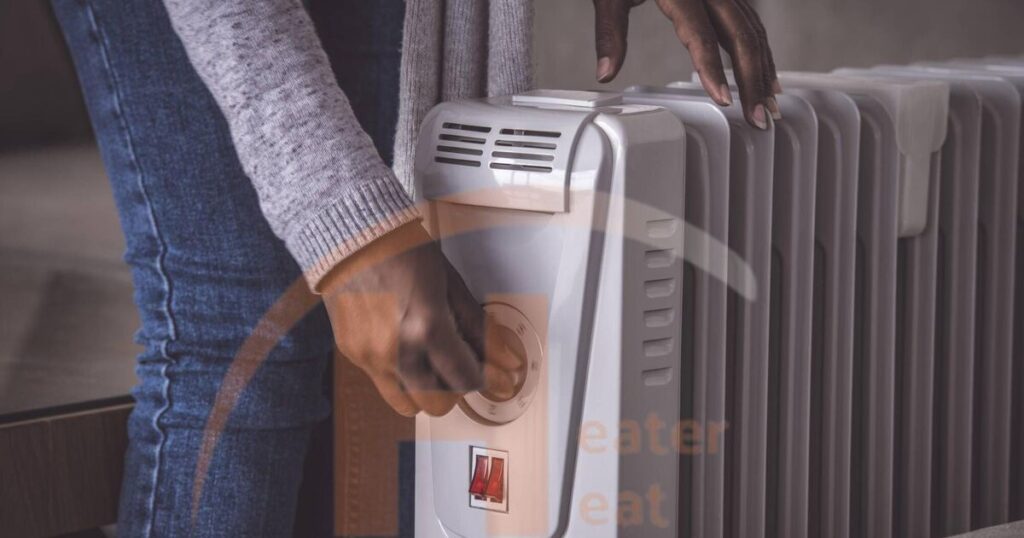
Choosing an electric or gas heater involves considering your specific needs and the available options. Begin by determining the size of the space you want to heat. For smaller rooms, a portable heater may suffice, while larger areas may require a more powerful unit or even multiple heaters.
Look at the types of electric heaters available, such as convection, radiant, or ceramic heaters. Convection heaters warm the air, radiant heaters directly heat objects, and ceramic heaters combine both methods. Consider safety features like tip-over switches and overheat protection.
Assess energy efficiency by checking the heater’s wattage and whether it has adjustable settings. Reading customer reviews and comparing prices will help you make an informed decision when choosing an electric heater that suits both your heating needs and budget.
Factors Affecting Energy Consumption
Various factors influence the amount of energy we use in our homes and businesses. One important factor is the types of appliances we choose energy-efficient ones generally use less electricity. How often and how long we use these appliances also matters; regular maintenance and proper insulation can help optimize energy efficiency.
Heater wattage and power rating
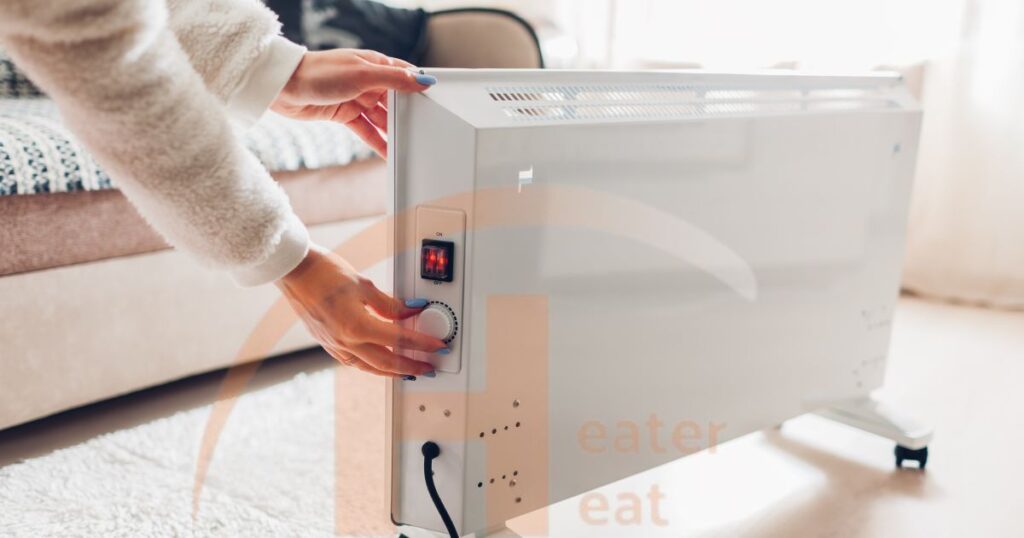
Heater wattage and power rating play a crucial role in determining the electricity consumption of an electric heater. The wattage represents the amount of power the heater consumes, and it is directly proportional to its energy usage. Higher-wattage heaters generally draw more electricity, resulting in increased energy costs.
Understanding the wattage of your electric heater is essential for estimating its impact on your monthly utility bill. Power rating, closely related to wattage, is another factor influencing an electric heater’s energy consumption. The power rating indicates the heating capacity of the device. While a higher power rating implies faster heating, it also means increased electricity consumption.
Consumers need to balance their heating needs with energy efficiency when choosing an electric heater, considering both wattage and power rating to find an optimal solution that meets their comfort requirements while minimizing electricity usage.
Duration of use
The amount of electricity consumed by an electric heater is significantly influenced by the duration of its operation. The longer the heater is in use, the more electricity it will consume. For instance, running a heater for several hours each day during the winter months will result in higher energy consumption compared to sporadic use for shorter durations.
Users must be mindful of the time their electric heaters are active to manage energy costs effectively. Energy-conscious practices such as setting timers, using programmable thermostats, and turning off the heater when not needed can contribute to substantial energy savings.
By carefully monitoring and regulating the duration of electric heater usage, individuals can strike a balance between comfort and energy efficiency, ultimately influencing the overall electricity consumption associated with these devices.
Insulation and room size
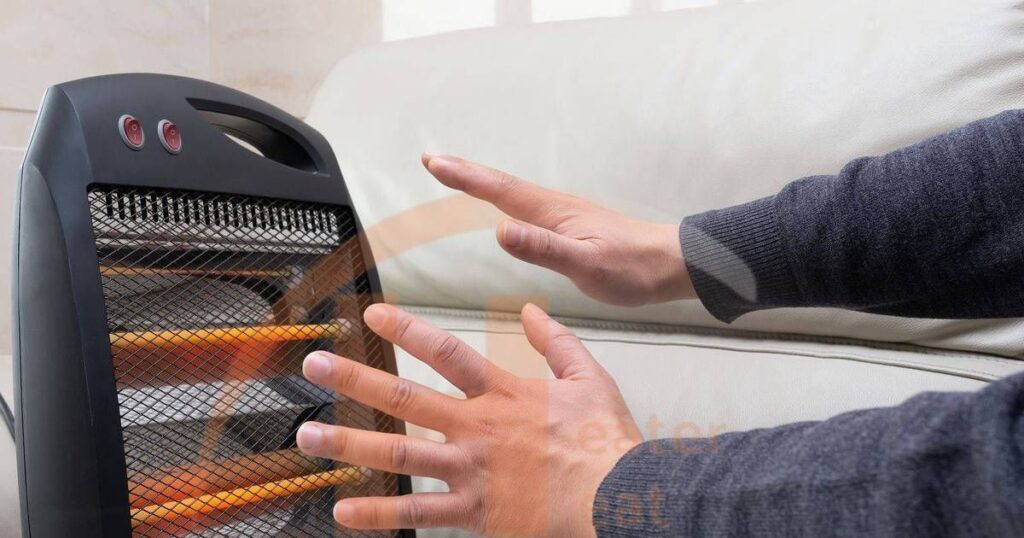
Insulation and room size play crucial roles in determining how much electricity an electric heater consumes. Adequate insulation is like a cozy blanket for your home, preventing heat from escaping and reducing the workload on the heater.
Well-insulated spaces retain warmth more efficiently, allowing the electric heater to operate more effectively and consume less electricity. The size of the room directly impacts the heating requirements. Larger rooms demand more energy to reach and maintain a comfortable temperature.
It’s essential to match the heater’s capacity to the room size, as using an undersized heater in a spacious area may lead to prolonged operation and increased energy consumption. Proper insulation combined with consideration of room dimensions ensures optimized energy use and a more cost-effective heating experience.
Temperature settings
The temperature settings on an electric heater play a crucial role in determining its energy consumption. Generally, higher temperature settings require more energy to maintain, leading to increased electricity usage. Users need to strike a balance between comfort and efficiency when selecting temperature settings to optimize energy consumption.
Users can significantly impact their electricity bills by being mindful of the thermostat. Setting the heater at a moderate temperature rather than cranking it to the maximum can result in substantial energy savings. Regularly adjusting the thermostat based on the actual need for warmth in a given space can contribute to a more efficient use of electricity, ensuring both comfort and cost-effectiveness.
Comparison with Other Heating Methods
When comparing electric heaters to other heating methods, it’s essential to consider efficiency and energy consumption. Traditional heating methods, such as gas or oil-based systems, often involve energy losses during combustion and distribution.
Electric heaters vs. Gas heaters

Electric heaters and gas heaters are two popular options for heating homes, each with its own set of advantages and drawbacks. Electric heaters operate by converting electricity directly into heat, making them relatively easy to install and use. They are often more efficient in smaller spaces and require minimal maintenance. They tend to be more expensive to operate than gas heaters, as electricity is generally a higher-cost energy source.
Gas heaters use natural gas or propane to generate heat, providing a cost-effective alternative in regions where gas prices are lower. They are often preferred for larger spaces or homes with multiple rooms, as they can produce more heat at a lower cost compared to electric heaters.
Gas heaters, however, come with the need for proper ventilation and maintenance, and the installation process may be more complex. When deciding between electric and gas heaters, it’s essential to consider factors such as energy costs, heating requirements, and the specific needs of the space being heated.
Efficiency comparisons
Efficiency comparisons play a crucial role in understanding the energy consumption of electric heaters in comparison to other heating methods. When evaluating efficiency, it’s essential to consider the conversion of electrical energy into heat. Electric heaters are known for their high efficiency in this regard, as nearly 100% of the electricity they consume is converted into heat.
In contrast, traditional methods like gas or oil heating systems may experience energy losses during combustion and heat transfer, resulting in lower overall efficiency. Compared to central heating systems that distribute warmth through ducts, electric heaters provide localized heat, minimizing energy wastage.
This targeted heating approach ensures that the energy used directly warms the intended space, making electric heaters a more efficient choice for smaller areas. As technology advances, electric heaters continue to improve in efficiency, making them a competitive and eco-friendly option in the realm of heating solutions.
Cost considerations
Cost considerations play a crucial role when evaluating the electricity usage of electric heaters. While electric heaters are generally efficient at converting electricity into heat, the cost per unit of electricity can vary widely based on geographical location and utility rates.
Consumers need to be aware of their local electricity rates and consider the overall energy efficiency of the heater to determine the long-term cost implications. When comparing electric heaters with other heating methods like gas or oil, it’s important to factor in the total cost of ownership. Electric heaters may have a higher upfront cost, but they often require less maintenance and have a longer lifespan.
The environmental impact and availability of energy sources in a particular region should be considered when making cost-effective and sustainable heating choices. In the end, understanding the complete cost picture helps consumers make informed decisions about the most economical heating solution for their specific needs.
Final Thoughts
Delving into the realm of electric heaters reveals important insights into energy consumption for informed decision-making. Electric heaters are common household appliances, but comprehending their electricity usage is vital for effective energy management. These devices convert electrical energy into heat, and understanding the associated costs is essential for both economic and environmental reasons.
As we analyze the energy consumption of electric heaters, we find that the wattage, usage duration, and electricity rates play pivotal roles. By calculating the total energy consumption, users can make conscious choices to balance comfort and conservation. This knowledge empowers individuals to adopt strategies that optimize energy usage, reduce electricity bills, and contribute to a sustainable future. An awareness of electric heater consumption enables users to explore alternative heating solutions, such as energy-efficient models or supplementary methods like insulation.
Knowledge about the electricity usage of electric heaters not only aids in cost reduction but also aligns with global efforts to mitigate energy-related environmental impacts. As responsible consumers, understanding and managing our electric heater usage is a small yet impactful step towards a greener and more sustainable lifestyle.
Frequently Asked Questions
How much electricity does an electric heater typically consume?
It varies, but on average, small heaters use around 750 watts, while larger ones can go up to 1500 watts.
What factors influence the electricity usage of an electric heater?
The size of the heater, temperature setting, insulation, and usage duration all play a role.
Are there energy-efficient electric heaters available to reduce power consumption?
Yes, look for heaters with an Energy Star label or those equipped with advanced heating technologies.
Can using a thermostat helps in controlling the electricity usage of an electric heater?
Absolutely. A thermostat helps maintain a desired temperature, preventing unnecessary energy consumption.
Any tips for minimizing electricity costs when using an electric heater?
Use space heaters in well-insulated rooms, dress warmly, and only heat occupied spaces to save on energy.

Mark Edward, with 6 years of expertise in Electric Heaters, is the author at heaterheat.com. His in-depth knowledge provides valuable insights into efficient heating solutions, making him a trusted resource.
